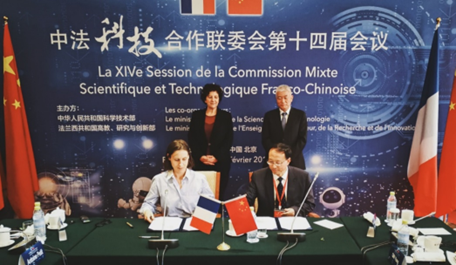"PLANTOMIX" is an international joint laboratory established by Yunnan Agricultural University and the French Institute of Agricultural Sciences. It was signed in February 2019 at the 14th session of the Sino-French Joint Committee on Scientific and Technological Cooperation, in the presence of the Chinese and French Ministers of Science and Technology. The joint laboratory aims to analyze in depth the mechanism of sustainable and ecological improvement of diversity planting and guaranteeing plant health. Taking advantage of the complementary scientific and technological advantages of China and France to promote the use of crop diversity cultivation to achieve the development of the field of plant protection research. Through academic exchanges, technology introduction, scientific research cooperation, joint training and hosting international conferences and other ways, to carry out original and critical technology research, and strive to achieve major innovative breakthroughs, make outstanding achievements, academic and technical achievements strive to reach the leading level at home and abroad.

The Sino-French International Joint Laboratory was established in the presence of the ministers of science and technology of both countries.
Cooperation areas
1. Intraspecific genetic diversity and plant conservation
Taking the Yuanyang terraces as the main research object, we will thoroughly study the influence of genetic diversity of local rice varieties on disease epidemic occurrence and genetic evolution of pathogenic populations, and reveal the effect mechanism of plant-plant interactions driving crop population resistance in diverse cropping systems.
2. Interspecific intercropping and plant protection
Taking maize/pepper and wheat/beans models as research objects, we will study in depth the chemical ecological mechanisms of crop resistance to pests induced by species intercropping, including plant-plant intercropping, plant-microbe intercropping and plant-microbe-plant intercropping, to provide scientific basis for sustainable disease control using species diversity planting.
3、Continue to expand bilateral cooperation
Continue to promote bilateral cooperation and promote our cooperation with different research centers of INRAE, including but not limited to collaborative research with PV, PSH and GAFL institutes in plant viruses and crop breeding, collaborative research with ISA institute in pathogenic nematodes and oomycetes, collaborative research with CBGP and IEES institute in insect diversity and insect chemical ecology, etc.
4、Organize and hold international academic conferences
We co-organize international academic conferences on the theme of diversity planting, covering plant protection, plant nutrition, plant intercropping and intercropping system management, etc. We invite famous scholars and peers in related fields at home and abroad to attend the conferences, so as to further expand the international influence of the laboratory in the field of biodiversity conservation and utilization research, and further strengthen the scientific and technological cooperation with international first-class research institutes.
Partner Introduction
INRAE is the world's largest agricultural, food and environmental research institute. It has 21 research centers and 277 affiliated research units around the world, which are dedicated to solving the major problems and challenges faced by the whole society in the field of agriculture, and have strong scientific strength. The PHIM Institute, a joint research unit of INRAE, Cirad, IRD, SupAgro and MUSE, is the largest research institute of INRAE, with more than 200 researchers, and conducts comprehensive research on plant-pathogen interactions, covering ecology, plant pathology, plant physiology, disease epidemiology, genetics, genomics, molecular biology and bioinformatics, etc. It has gathered the world's top research scholars and is a world-renowned research center of plant pathology.
PHIM website: https://umr-phim.cirad.fr/en